Hi there, my name is Suvi and I am a first-year international student at UBC. During my first year, I enrolled in the Coordinated Arts Program (CAP) and took courses in the Global Citizens stream. One of the courses that I took was Sociology 100, which was instructed by Dr. Kerry Greer. Within our first month of attending lectures, we were given the option to either participate in the TREK program (where we only had to meet once every month) or to attend regular discussions every week. Obviously, this appealed to me because not only did I want to volunteer at a community program and do some social work, but I also thought I’d be getting first-hand experiences that other students might not have the opportunity to do. Hence, I thought this would be a great opportunity for me to learn more about the community in Vancouver and get to be more engaged by interacting with the community. Also, due to the fact that my future goal is to open my own social enterprise business related to doing social work, I thought participating in TREK would give me a good foundation to understand how a non-profit business (in this case, an organization) runs and the factors I have to take into consideration when working with specific vulnerable communities.
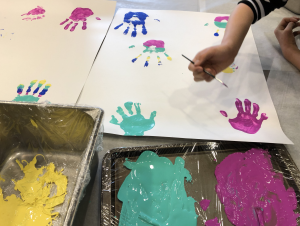
Self-Taken Photograph of Kids Painting for our TREK Final project
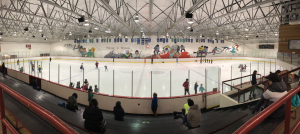
Self-Taken Photograph at our outing to Britannia Ice-Skating Hall
For my TREK placement, I volunteered at the YWCA Crabtree Corner in the “Saturday Family Activity Program” which is located on East Hastings in Downtown Vancouver. Today, YWCA is known as one of the largest and most diversified non-profit organizations in Metro Vancouver. Crabtree Corner provides a range of programs and services in one location to help marginalized women and families residing in Vancouver’s Downtown Eastside, in hopes that they will feel healthier, more connected and empowered to make positive choices. The Saturday Family Activity Program aims to target families living in the Downtown Eastside by providing them with resources to engage with family activities. When working with YWCA Crabtree Corner, I noticed that they provided this program because families in the Downtown Eastside often don’t have the resources to allocate towards family activities, we get a chance as volunteers to help cook these families a hot meal, and provide them with opportunities to take part in fun and enriching activities. Some of the fun and enriching activities we do at the program include; Trick or Treating during Halloween, birthday parties, going to the Bloedel Conservatory Centre, going to the Hillcrest Swimming Pool and many more. I was really interested in the Saturday Family Activity Program because not only did it give me incentives to explore what Vancouver has to offer but I was able to spend time watching over and playing with the kids in the families who were a part of the program.
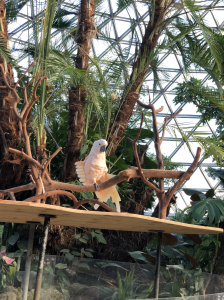
Self-Taken Photograph of our outing at Bloedel Conservatory Center
In a nutshell, the normal routine of my Saturday spent at TREK looks a bit like this, I arrive in the morning at 10AM and I head to the kitchen to help out with the breakfast and lunch we are prepping for the families. After doing some breakfast meal prep, if the arts and crafts aren’t distributed out in the dining hall area for the children, I would go looking for the arts and crafts and distribute the different crafts/games/books evenly amongst the dining tables. If the back doesn’t need help with meal prepping for lunch, I would spend time with the families who have arrived. Most of the time, I spend time with the kids and help them with whatever arts and crafts they would like to do because their parents are usually busy occupying themselves. Sometimes if there are board games or interactive games available, I would play with a group of kids and we would spend time getting to know each other. Often near lunch time I’d have to rush back to the kitchen to help out with meal prep again to prepare the lunch for the families. We work collectively at the back with other volunteers and our chef supervisor. I have actually grown to really enjoy being a part of this program because not only has it taught me so many kitchen skills that I wouldn’t have learned on my own, but I also get to spend time with the families and learn more about their background because they often talk about their daily experiences and encounters with other people in the Downtown Eastside community.
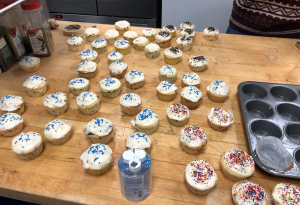
Self-Taken Photograph of the birthday parties we host every month
Before I came to Vancouver, I was unaware about the conditions and historical background of the Downtown Eastside. All I heard about Vancouver was that it was a beautiful city to live in and that I would blend in perfectly because of my cultural background. However, as I was strolling around Vancouver I accidently stumbled upon the Downtown Eastside because I was making my way to Gastown. Walking around the Downtown Eastside, I felt unsafe and wasn’t sure if it was an area that I’d want to spend my time being in. Coming to UBC, I’ve heard several stereotypes and labels of the Downtown Eastside being an “unsafe, dangerous” or “shady/sketchy” area where people with mental health issues, prostitution and drug addicts are prevalent. Even though some of these stereotypes may be true, throughout my time volunteering I learned that there are individuals who are trying to have a better life, even though they are struggling with issues in their everyday life, they are trying to look for help and guidance in places like the YWCA Crabtree Corner in hopes that they will make better decisions and provide better lives for their children. Another thing that I noticed was their support and concern for each other, they had quite a close-knit community and they worked on encouraging each other. It was particularly interesting because even though they all had different experiences and some were from differing cultural backgrounds, everyone had their own fair share of struggles and each narrated a different life story. They were all unique in their own way but continued to support each other during their happiest and saddest moments. The families who attended the Saturday Family Activity Program had a cohesive community and even though some of them had weak ties, they were open to sharing information and resources with each other.
Volunteering in the YWCA Crabtree Corner has been beneficial to my learning development in UBC and especially useful in my sociology course. Not only was I able to integrate my experiences in my TREK placement to the content and concepts we were learning in the sociology course, but I was able to apply it to enhance my understanding of how what we learned in class is reflected in society. Thus, because I have become more knowledgeable and aware of my surroundings, it’ll increase the chances of me thinking of ways to implement strategies to improve or alleviate some issues which are prevalent in our society. For instance, being in a sociology course has allowed me to view the world through a different lens also known as the sociological perspective where I observe the general patterns instead of unique events or attempt to debunk the stereotypes that are placed upon a group of people and how that could affect their behavior towards society. I was also able to integrate my ideas of strong ties and weak ties by observing the relationships between family members and how they use these strong or weak ties to interact with each other in order to benefit from one another when exchanging resources/information or form closer relationships. Furthermore, I was able to apply the importance of family and how family functions as an important private function between family members to show emotional support and shared responsibility for the household and financial support. This is also related to the changing of family structures over time as nowadays there is a rising rate of divorces and more women are entering the workforce to support their children’s needs. Lastly, I think the concept of intersectionality and stereotypes was especially important when working with these vulnerable communities because most of the individuals are facing multiple forms of inequality and social injustice which causes them to be left out by society as they suffer from marginalization and social exclusion.
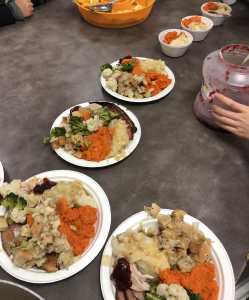
Self-Taken Photograph of our first Turkey Dinner for Christmas
Overall, I am extremely grateful for this opportunity to be able to work with these vulnerable communities in the Downtown Eastside as I learn more about their supportive community and I am able to place myself in their situations and the struggles they face on a daily basis. Joining the TREK program has definitely helped me to integrate into university life because I have become more aware of the environment and the society around me and that’s essential to understanding my social context and what kind of role I play in society. It gave me the opportunity to interact with others and step out of my comfort zone in hopes of becoming more open-minded which I personally think is an essential mindset and skill to have continuing university.